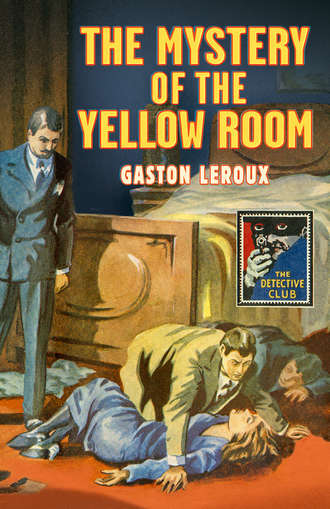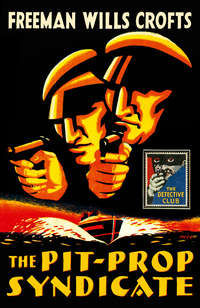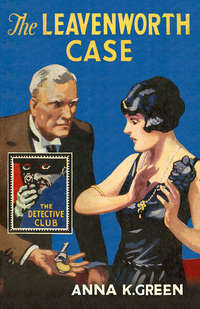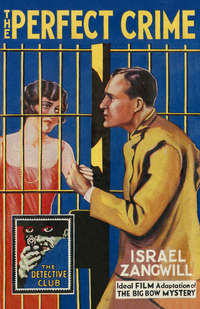
Полная версия
The Mystery of the Yellow Room
‘No, Monsieur, it was closed; but after I had done washing the floor, I lit some charcoal for Monsieur in the laboratory furnace, and, as I lit it with old newspapers, it smoked, so I opened both the windows in the laboratory and this one, to make a current of air; then I shut those in the laboratory and left this one open when I went out. When I returned to the pavilion, this window had been closed and Monsieur and Mademoiselle were already at work in the laboratory.’
‘Monsieur or Mademoiselle Stangerson had, no doubt, shut it?’
‘No doubt.’
‘You did not ask them?’
After a close scrutiny of the little lavatory and of the staircase leading up to the attic, Rouletabille—to whom we seemed no longer to exist—entered the laboratory. I followed him. It was, I confess, in a state of great excitement. Robert Darzac lost none of my friend’s movements. As for me, my eyes were drawn at once to the door of the Yellow Room. It was closed and, as I immediately saw, partially shattered and out of commission.
My friend, who went about his work methodically, silently studied the room in which we were. It was large and well-lighted. Two big windows—almost bays—were protected by strong iron bars and looked out upon a wide extent of country. Through an opening in the forest, they commanded a wonderful view through the length of the valley and across the plain to the large town which could be clearly seen in fair weather. Today, however, a mist hung over the ground—and blood in that room!
The whole of one side of the laboratory was taken up with a large chimney, crucibles, ovens, and such implements as are needed for chemical experiments; tables, loaded with phials, papers, reports, an electrical machine—an apparatus, as Monsieur Darzac informed me, employed by Professor Stangerson to demonstrate the Dissociation of Matter under the action of solar light—and other scientific implements.
Along the walls were cabinets, plain or glass-fronted, through which were visible microscopes, special photographic apparatus, and a large quantity of crystals.
Rouletabille, who was ferreting in the chimney, put his fingers into one of the crucibles. Suddenly he drew himself up, and held up a piece of half-consumed paper in his hand. He stepped up to where we were talking by one of the windows.
‘Keep that for us, Monsieur Darzac,’ he said.
I bent over the piece of scorched paper which Monsieur Darzac took from the hand of Rouletabille, and read distinctly the only words that remained legible:
Presbytery—lost nothing—charm, nor the gar—its brightness.
Twice since the morning these same meaningless words had struck me, and, for the second time, I saw that they produced on the Sorbonne professor the same paralysing effect. Monsieur Darzac’s first anxiety showed itself when he turned his eyes in the direction of Daddy Jacques. But, occupied as he was at another window, he had seen nothing. Then tremblingly opening his pocket-book he put the piece of paper into it, sighing: ‘My God!’
During this time, Rouletabille had mounted into the opening of the fire-grate—that is to say, he had got upon the bricks of a furnace—and was attentively examining the chimney, which grew narrower towards the top, the outlet from it being closed with sheets of iron, fastened into the brickwork, through which passed three small chimneys.
‘Impossible to get out that way,’ he said, jumping back into the laboratory. ‘Besides, even if he had tried to do it, he would have brought all that ironwork down to the ground. No, no; it is not on that side we have to search.’
Rouletabille next examined the furniture and opened the doors of the cabinet. Then he came to the windows, through which he declared no one could possibly have passed. At the second window he found Daddy Jacques in contemplation.
‘Well, Daddy Jacques,’ he said, ‘what are you looking at?’
‘That policeman who is always going round and round the lake. Another of those fellows who think they can see better than anybody else!’
‘You don’t know Frédéric Larsan, Daddy Jacques, or you wouldn’t speak of him in that way,’ said Rouletabille in a melancholy tone. ‘If there is anyone who will find the murderer, it will be he.’ And Rouletabille heaved a deep sigh.
‘Before they find him, they will have to learn how they lost him,’ said Daddy Jacques, stolidly.
At length we reached the door of the Yellow Room itself.
‘There is the door behind which some terrible scene took place,’ said Rouletabille, with a solemnity which, under any other circumstances, would have been comical.
CHAPTER VII
IN WHICH ROULETABILLE SETS OUT ON AN EXPEDITION UNDER THE BED
ROULETABILLE having pushed open the door of the Yellow Room paused on the threshold saying, with an emotion which I only later understood, ‘Ah, the perfume of the lady in black!’
The chamber was dark. Daddy Jacques was about to open the blinds when Rouletabille stopped him.
‘Did not the tragedy take place in complete darkness?’ he asked.
‘No, young man, I don’t think so. Mademoiselle always had a night-light on her table, and I lit it every evening before she went to bed. I was a sort of chambermaid, you must understand, when the evening came. The real chambermaid did not come here much before the morning. Mademoiselle worked late—far into the night.’
‘Where did the table with the night-light stand—far from the bed?’
‘Some way from the bed.’
‘Can you light the burner now?’
‘The lamp is broken and the oil that was in it was spilled when the table was upset. All the rest of the things in the room remain just as they were. I have only to open the blinds for you to see.’
Конец ознакомительного фрагмента.
Текст предоставлен ООО «ЛитРес».
Прочитайте эту книгу целиком, купив полную легальную версию на ЛитРес.
Безопасно оплатить книгу можно банковской картой Visa, MasterCard, Maestro, со счета мобильного телефона, с платежного терминала, в салоне МТС или Связной, через PayPal, WebMoney, Яндекс.Деньги, QIWI Кошелек, бонусными картами или другим удобным Вам способом.







